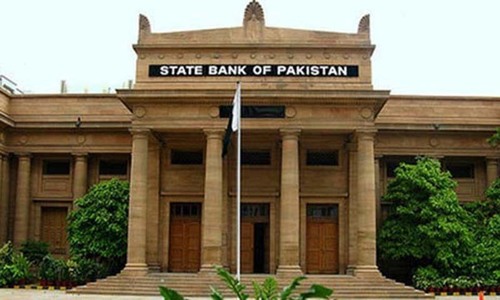A COUNTRY’S export competitiveness in the international market is determined by trade-weighted crucial real effective exchange rate.
REER may appreciate even when nominal exchange rate depreciates (rupee price of dollar increasing from 100 to 105, for example).
In other words, a country’s trade competitiveness may worsen even when the country’s currency has lost its nominal value.
The State Bank of Pakistan’s data show that the country’s trade-weighted nominal exchange rate (NEER) has depreciated by roughly 7pc since 2010. However, during the same period, REER has appreciated by 23pc until January 2016. The appreciation of REER has been much more pronounced over the last two years — a period which coincides with persistent decline in exports.
Exports for the first half of fiscal year FY16 have declined in dollar terms by 14.4pc on a year-on-year basis. More importantly, the balance of trade has worsened by 4.3pc.
Pakistan’s economy has been experiencing a similar trend for the last two years. While there are structural reasons such as energy crisis which have adversely affected the export growth, the recent decline can better be attributed to a loss in the price competitiveness of domestic products on the international market.
Very little attention has so far been paid to the exchange rate dynamics as a source of the exporting sector’s poor performance. The structure of economy and the composition of our export basket make it only more vulnerable to adverse movements in REER.
Very little attention has so far been paid to the exchange rate dynamics as a source of the exporting sector’s poor performance
Around 70pc of the country exports comprise of textile and food group with very little value addition. Professor Jeffrey Frankel of Harvard Kennedy School notes that countries, which export goods having only small value addition component, enjoy almost no price setting power.
Therefore, for such countries, small changes in the relative price of closely related goods produced by competing international producers can have significant implications for export demand of domestic goods. It was only natural that Pakistan’s exports would fall following an increase in REER.
At the same time REER appreciation caused an increase in the total import demand following a decline in the real price of imported goods.
The SBP data suggest that the imports of products in machinery and metals group increased sharply in dollar terms since fiscal year 2013.
Thus, despite a staggering fall in oil prices (with petroleum products accounting for 30pc of import bill), total import bill did not decline by as much as was anticipated by some analysts.
Consequently, despite the calm witnessed in the international commodity markets, our balance on goods and services has once again worsened to the level observed in FY08 — a period of skyrocketing commodity prices.
Pakistan’s REER has seen a year-on-year appreciation of 5.6pc and 8.8pc between FY14 and FY15, respectively, thus worsening the competitiveness of local products.
Bank of International Settlements has reported similar trends in REER across other emerging economies like India and China. These trends in REER are driven predominantly due to loose monetary policies (of which currency devaluation is a part) adopted by the EU and other advanced economies.
However, since the US and the EU alone constitute more than 45pc of the country’s export market, exchange rate policies in the US and the EU have significant implications for Pakistan’s export demand.
The adverse effect of the policies in the West must, therefore, be reversed. The rupee must be devalued to restore competitiveness.
Sharp devaluation can be destabilising for developing countries in an environment of increasing commodity and crude materials prices in the international market.
Since commodity and crude materials are used as inputs in firms’ production, devaluation, in an environment of increasing commodity and crude material prices, can further increase the cost of production and consequently inflation.
But today international prices of commodities and crude materials are at their lowest and expected to stay low. Devaluation, therefore, is not expected to significantly increase the input cost for domestic firms.
With inflation rate at 3.9pc and below the 6pc target set by the SBP, devaluation can even help achieve the set inflation target through both cost and demand effect.
In fact, today devaluation can also be politically beneficial. It will bring the rupee price of petroleum products back to the level where government will not have to resort to exorbitant rate of taxation on petroleum products to meet revenue targets.
Precisely, it is the best time and the easiest policy measure which can be implemented to reverse the tide of persistently declining exports.
The writer is a PhD candidate in Economics and teaches at the University of Bristol, UK
Published in Dawn, Business & Finance weekly, April 11th, 2016













































